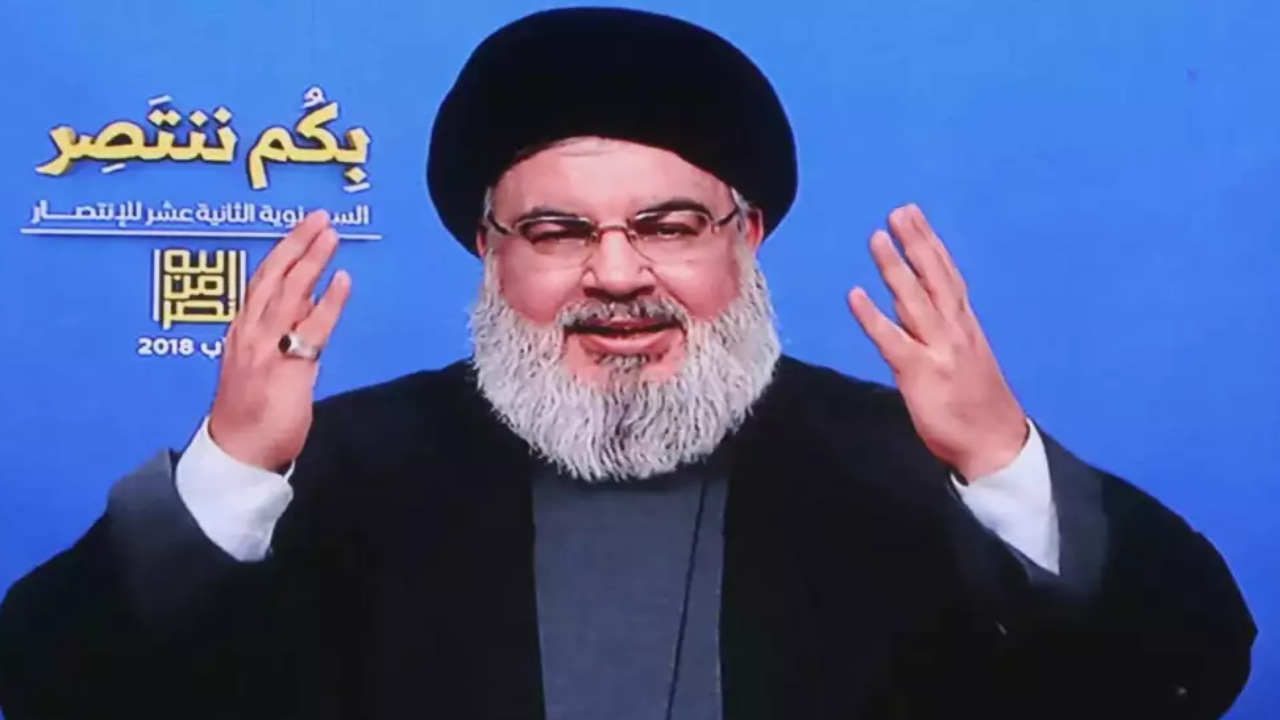[ad_1]
NEW DELHI: The leader of Lebanon’s Hezbollah on Friday described Israel’s recent strike on Iran‘s consulate in Damascus as a turning point since October 7 strike. This declaration follows escalating tensions in the region sparked by an attack on Israel by the Palestinian group Hamas.
The strike in Damascus on Monday resulted in the deaths of seven members of the Iranian Revolutionary Guards Corps, including Brigadier General Mohammad Reza Zahedi, a senior commander of the Quds Force.In response, Iran has vowed to seek revenge for the loss of its personnel. The incident underscores the volatile dynamics between regional powers and the potential for further escalation.
Iran-backed Hezbollah in televised remarks on Friday voiced its support for Iran’s stance, affirming its right to “punish” Israel in the wake of the recent strike on Iran’s consulate in Damascus. Sayyed Hassan Nasrallah, the leader of Hezbollah, hinted that a retaliatory response from Iran was imminent.
“Be certain, be sure, that the Iranian response to the targeting of the consulate in Damascus is definitely coming against Israel,” he said.
In anticipation of a potential retaliatory strike, Israel has taken preemptive measures by canceling leave for all combat units and deploying additional troops to bolster air defense units.
Addressing Israeli forces at an air base on Friday, Defence minister Yoav Gallant emphasized Israel’s resolve to confront its adversaries wherever necessary.
“It could be in Damascus and it could be in Beirut,” he said. “The enemy is badly hit in all places and is therefore looking for ways to respond. We are ready with a multi-layered defence.”
Up to this point, Iran has refrained from directly engaging in conflict, instead backing a series of attacks on Israeli and US interests by its allied groups across Lebanon, Syria, Yemen, and Iraq.
According to diplomats and analysts, Iran’s clerical leadership is wary of provoking an all-out war with Israel or the US, which could jeopardize its hold on power. Instead, they suggest that Iran prefers to utilize its proxies to conduct targeted tactical strikes against its adversaries.
Hezbollah since October 8, along with its ally Amal and Palestinian factions operating in Lebanon, have been engaged in exchanges of fire with Israel along Lebanon’s southern border.
According to security and medical sources, an Israeli airstrike on Saturday resulted in the deaths of three Amal fighters in the town of Marjayoun. Additionally, approximately 270 Hezbollah fighters have lost their lives in the clashes.
In remarks made on Friday, Nasrallah said that Hezbollah retains weapons and forces that have not yet been deployed against Israel, indicating the group’s readiness to escalate the conflict further if necessary.
(With input from agencies)
The strike in Damascus on Monday resulted in the deaths of seven members of the Iranian Revolutionary Guards Corps, including Brigadier General Mohammad Reza Zahedi, a senior commander of the Quds Force.In response, Iran has vowed to seek revenge for the loss of its personnel. The incident underscores the volatile dynamics between regional powers and the potential for further escalation.
Iran-backed Hezbollah in televised remarks on Friday voiced its support for Iran’s stance, affirming its right to “punish” Israel in the wake of the recent strike on Iran’s consulate in Damascus. Sayyed Hassan Nasrallah, the leader of Hezbollah, hinted that a retaliatory response from Iran was imminent.
“Be certain, be sure, that the Iranian response to the targeting of the consulate in Damascus is definitely coming against Israel,” he said.
In anticipation of a potential retaliatory strike, Israel has taken preemptive measures by canceling leave for all combat units and deploying additional troops to bolster air defense units.
Addressing Israeli forces at an air base on Friday, Defence minister Yoav Gallant emphasized Israel’s resolve to confront its adversaries wherever necessary.
“It could be in Damascus and it could be in Beirut,” he said. “The enemy is badly hit in all places and is therefore looking for ways to respond. We are ready with a multi-layered defence.”
Up to this point, Iran has refrained from directly engaging in conflict, instead backing a series of attacks on Israeli and US interests by its allied groups across Lebanon, Syria, Yemen, and Iraq.
According to diplomats and analysts, Iran’s clerical leadership is wary of provoking an all-out war with Israel or the US, which could jeopardize its hold on power. Instead, they suggest that Iran prefers to utilize its proxies to conduct targeted tactical strikes against its adversaries.
Hezbollah since October 8, along with its ally Amal and Palestinian factions operating in Lebanon, have been engaged in exchanges of fire with Israel along Lebanon’s southern border.
According to security and medical sources, an Israeli airstrike on Saturday resulted in the deaths of three Amal fighters in the town of Marjayoun. Additionally, approximately 270 Hezbollah fighters have lost their lives in the clashes.
In remarks made on Friday, Nasrallah said that Hezbollah retains weapons and forces that have not yet been deployed against Israel, indicating the group’s readiness to escalate the conflict further if necessary.
(With input from agencies)
[ad_2]
Source link


